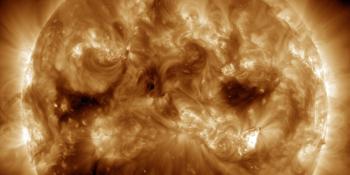Merry Christmas!
Sunday, 24 December 2017 18:48 UTC

We are currently under the influence of a coronal hole solar wind stream. The solar wind speed has picked up to 550km/s but there hasn't really been much of a geomagnetic response as the solar wind density and interplanetary magnetic field values have been rather mediocre.
This solar wind comes from a very long and narrow coronal hole that obviously wasn't capable of producing much of a dense shock wave (also known as a Co-rotating Interaction Region) ahead of the high speed solar wind stream. It is usually this shock ahead of the high speed solar wind stream that causes the most geomagnetic instability. A fun fact you might didn't know before.
Remain vigilant nonetheless in the hours ahead, if the direction of the IMF (Bz) turns southward for a while we might still end up with active geomagnetic conditions with a Kp of 4.
That's what we have in store for you here on planet Earth but back on our Sun things are really quiet. Solar activity is very low (A and B class only) despite the presence of one numbered sunspot region on the earth-facing disk. Sunspot region 2692 is however a simple Beta sunspot region which isn't capable of producing C, M or X-class events. We are slowly crawling towards solar minimum.
Now that you're up to date again, we'd like to wish all of our visitors a very Merry Christmas!
Header image provided by Ed Touwen.
Thank you for reading this article! Did you have any trouble with the technical terms used in this article? Our help section is the place to be where you can find in-depth articles, a FAQ and a list with common abbreviations. Still puzzled? Just post on our forum where we will help you the best we can!
Latest news
Latest forum messages
Support SpaceWeatherLive.com!
A lot of people come to SpaceWeatherLive to follow the Sun's activity or if there is aurora to be seen, but with more traffic comes higher server costs. Consider a donation if you enjoy SpaceWeatherLive so we can keep the website online!

Space weather facts
| Last X-flare | 2025/03/28 | X1.1 |
| Last M-flare | 2025/04/01 | M5.6 |
| Last geomagnetic storm | 2025/03/27 | Kp5 (G1) |
| Spotless days | |
|---|---|
| Last spotless day | 2022/06/08 |
| Monthly mean Sunspot Number | |
|---|---|
| February 2025 | 154.6 +17.6 |
| Last 30 days | 128.5 -22.7 |


